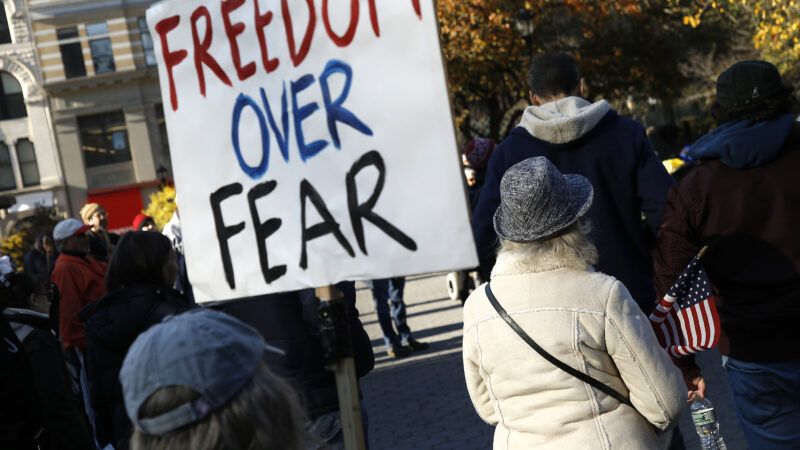Freedom Becomes a Long-Haul COVID Victim
Emergency measures to deal with the crisis are likely to linger long after COVID-19 is gone.

We call it "long-haul COVID" when patients recover from a COVID-19 infection but still experience symptoms weeks and months later. But the world at large could suffer lingering effects from the pandemic for years, as "emergency" measures adopted to (supposedly) fight the virus become part of the permanent landscape. Well after health concerns have been forgotten, the ultimate victim of long-haul COVID may turn out to be our freedom.
"The COVID-19 pandemic seriously risks further erosion of constraints on government powers, as leaders with an authoritarian bent amass new powers through emergency measures, and courts, legislatures, and other institutional and citizen checks are hampered in carrying out their constitutional duties and rights," the Brookings Institution's Ted Piccone noted last month in a column that warned of deteriorating conditions under authoritarian regimes and democracies alike. "In sum, the COVID-19 crisis has eroded the rule of law environment around the world," he added.
The erosion of constraints on government power is nothing new to Americans, who have seen governors assume near-monarchical power to close businesses, limit gatherings, curtail the right to travel, and limit personal freedom.
"There may not be a pandemic exception to the bill of rights, but judges are generally willing to give state officials a great deal of deference in these situations," Wake Forest University's Professor John Dinan, an expert on federalism, observed last May.
The federal government, too, has assumed vast power over everyday activity, and politicians have seized the opportunity to spend trillions of dollars to "stimulate" the economy—but mostly to buy public favor and enact wish-lists of policies in the guise of addressing the crisis.
President Joe Biden is "turning COVID-era emergency measures into permanent expansions of federal power, using the virus as an excuse," Reason's Peter Suderman warned last week. "For Biden, the pandemic has become a catchall justification for a wide array of big-government programs that he and the Democratic Party already wanted to pursue."
As Piccone points out, this is a world-wide phenomenon that's accelerating a global erosion of restraints on government power. He's not the only one to notice that officials everywhere have taken advantage of the moment to accelerate troubling pre-pandemic trends.
"As recorded in the Democracy Index in recent years, democracy has not been in robust health for some time," The Economist's Democracy Index 2020 observed earlier this year. "In 2020 its strength was further tested by the outbreak of the coronavirus (Covid-19) pandemic… Across the world in 2020, citizens experienced the biggest rollback of individual freedoms ever undertaken by governments during peacetime (and perhaps even in wartime). The willing surrender of fundamental freedoms by millions of people was perhaps one of the most remarkable occurrences in an extraordinary year "
"As COVID-19 spread during the year, governments across the democratic spectrum repeatedly resorted to excessive surveillance, discriminatory restrictions on freedoms like movement and assembly, and arbitrary or violent enforcement of such restrictions by police and nonstate actors," agrees Freedom House.
"While the world is still more democratic than it was in the 1970s and 1980s, the global decline of liberal democracy continues in 2020," chimes in the annual report from the University of Gothenburg's V-Dem Institute, based in Sweden. "The direct impact on democracy has been limited so far, but the final toll may turn out to be much higher unless restrictions are eliminated immediately after the pandemic is over," the report adds.
That's a big "unless" and one that can't be assumed after the crisis of the moment has passed. Expanded powers assumed to deal with emergencies have a nasty way of becoming permanent fixtures long after their justifications are consigned to historical footnotes.
"After each major crisis the size of government, though smaller than during the crisis, remained larger than it would have been had the precrisis rate of growth persisted during the interval occupied by the crisis," wrote economic historian Robert Higgs in his 1987 book Crisis and Leviathan. Separately, he has written that the driving force behind permanent "ratchet effect" expansions of power is the public's fear—and politicians' skill at exploiting it.
"All animals experience fear—human beings, perhaps, most of all. Any animal incapable of fear would have been hard pressed to survive," Higgs observed in 2005. "The people who have the effrontery to rule us, who call themselves our government, understand this basic fact of human nature. They exploit it, and they cultivate it."
Some people not only admit their interest in exploiting the crisis—they celebrate it.
"Crises have always granted reformist policymakers powers to bypass legislative gridlock and entrenched interests," exulted Cornell University historian Nicholas Mulder last March. "The coronavirus crisis is already allowing the implementation of ideas that would have been considered very radical just months ago."
Mulder did his happy dance before governments further tightened lockdowns, extended their control, and restricted the speech of those who disagree. Once-radical ideas are, in fact, becoming the norm in even nominally free countries.
The ratchet effect doesn't explain why limits on government, rule of law, and protections for liberty were eroding even before COVID-19 arrived on the scene. The ongoing, years-long decay of liberal democracies is a puzzle with which experts grappled before the pandemic and, no doubt, will debate after it has passed. But the environment in which they continue their discussions is likely to be less free and open as a result of the symptoms of long-haul "emergency" measures that the world just can't shake.

Show Comments (141)